The Legal Resources Centre (LRC) and the Centre for Applied Legal Studies (CALS) co-hosted a public debate entitled “A binding treaty on transnational corporations and other business enterprises with respect to human rights: A good or bad idea?” on Friday 19 February at the University of Witwatersrand Law School. The panellists were Ana María Suárez Franco (FIAN International), Alan Fine (Russell & Associates) and Nomonde Nyembe (CALS). Mabatho Molokomme (LRC) facilitated. The debate proved an engaging platform for a diverse range of people to meet and talk corporate accountability. This piece presents some of the stories and opinions that were shared at the public debate.[i]
South Africa has an obligation to set an example in the debate surrounding the proposed binding instrument on transnational corporations and other business enterprises with respect to human rights (Treaty). It is one of the two countries[ii] that sponsored the Human Rights Council resolution creating a negotiation space towards such a Treaty. It is also the source of significant corporate activity, especially in extractive industries, with some very serious human rights implications. For example, in some instances, people in South Africa live near mines in appalling conditions; without access to safe water, staying in makeshift shanty huts next to sewerage and waste dumps, and breathing in the hazardous by-products of mineral wealth.
Africa needs to mobilise. African civil society should grasp this opportunity for change. But how, and to what end? What use is a Treaty to address these problems? Here is what was said.
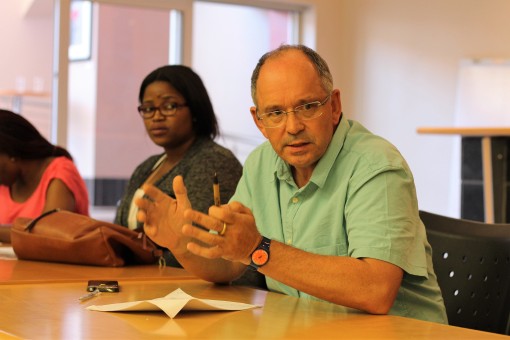
What current mechanisms do we have to address corporate human rights abuses and crimes and are they adequate? Is there a need for a Treaty? Might the Treaty distract from achieving short-term gains?
Alan Fine: The important question is what kinds of corporate breaches of human rights are not covered in state domestic law – whether statute, code, common law or other? What acts or omissions do supporters of the Treaty think need to be included in the treaty? Would a Treaty really add to the existing mechanisms under human rights law? Citizens should try to have gaps in their own legal systems filled before the Treaty eventuates, as this will likely take a long time to eventuate. Countries should develop National Action Plans (NAP) under the United Nations Guiding Principles on Business and Human Rights (UNGPs). State-owned enterprises should put in place systems for dealing with human rights of stakeholders, similar to Swedish state entities.
Nomonde Nyembe: While the strengthening of domestic systems to regulate corporate conduct is essential, corporations look for weak zones with little or no governance. Recognising that working towards a Treaty is a long-term process, the value of such a treaty, if ratified, would be its broad application to all states.
Ana María Suárez Franco: There is much work being done in relation to the current mechanisms. For example, FIAN International and others are conducting community support, awareness raising, domestic litigation – in affected communities and beyond, monitoring implementation of cases decided by courts, and working at all levels for compliance with extra-territorial obligations – including all human rights bodies. Other organisations are involved in assessing NAPs, particularly ahead of the 5th anniversary evaluation of the UNGPs in June this year. While standards such as the UNGPs might have some positive elements, they remain soft law and are just a step towards stronger legal protection at the international level, namely, hard law. We must be wary of the risks of touting human rights due diligence processes as a criterion to define corporate liability, due to the risk of misuse of these processes as company checklists that exclude corporations from accountability. Criteria for the determination of corporate liability should be centred on the affected communities and not derive from mere conduct obligations of corporations.
Pitso Montwedi (Department of International Relations and Cooperation): The corporate sector is exploiting weak national legislation and engaging in political corruption. In the context of grave human rights violations, strengthening national legislation is not necessarily the best route. Instead, we need to create an international criminal court for corporations that commit crime against human rights. In relation to NAPs, South Africa is not opposed to states going ahead with NAPs, but the country does not believe it is the way to go because the UNGPs were never inter-governmental, and they are voluntary and were never adopted by the General Assembly.
Audience commentary: NAPs are not taking us further; look at the utter inadequacy of the due diligences processes of South African companies Lonmin and Aquarius. They are merely pretending to comply with instruments, including UNGPs. What are we doing in domestic regulation to set an example? For example, Zambian communities are suffering some shocking abuse from South African security companies which are employed there by Canadian companies, such as First Quantum Minerals. Zambia has no recourse against the Canadian company, and so is using South African law as a bridge.
Audience commentary: Corporate dialogue is what we are looking for and we don’t necessarily need to look beyond the UNGPs to find it. In order for corporations to stop bad things happening, they must get involved and make sure good things are happening through, for example, due diligence worker councils and participation. Human rights due diligence is actually a very radical proposition, that is, what it means to put rights holders at core of corporate decision-making.
What are some major concerns that need to be addressed?
Suárez Franco: Three specific concerns of FIAN International relate to: (1) the weakness of existing remedy mechanisms, which do not cover the extraterritorial obligations, and the use of grievance mechanisms to hinder access to justice, (2) the risk of “human rights abuse-based dumping” – that is, the higher costs of those businesses that respect human rights compared to those that do not and so the associated need for a level playing field at the international level, and (3) the need to combat the fear of a negative impact on investments in those states supporting the Treaty process.
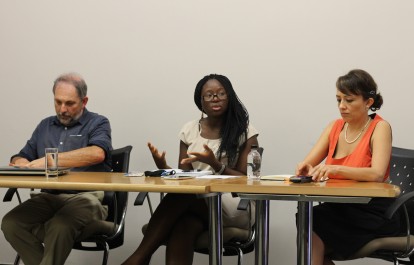
What content should the Treaty cover?
Nyembe: The Treaty should not be limited to gross human rights violations; this would miss the challenges that people face every day with human rights abuse. The Treaty should further be mindful of how corporate activities play out in a gendered way and be gender-conscious. This would allow the Treaty to not be narrow in its avenues for relief. For example, the victims of mine-related silicosis are not just the sufferers themselves, but may also include the women who must then care for the sick. Not only should the content be gender conscious, but so too should the process be sure to involve people from intersectional backgrounds. For those civil society members and NGOs who are not ECOSOC-accredited, the Treaty process should be more accessible.
In particular, the Treaty should attempt to address poverty. Economic development is consistently valued over other types of development. This approach exacerbates systems of poverty. While we recognise that not having access to essentials such as housing, education and water are individually violations of human rights, the collective outcome of “poverty” is not a violation. It should be. The Treaty process should be mindful of the current global economic status and disaggregate corporate benefit from the current wealth structure.
Suárez Franco: The Treaty should only impose human rights obligations on states and not on corporations. Imposing human rights obligations on corporations is legally impossible under international human rights law, since human rights are designed to limit state power, based on the principles of democracy and people’s sovereignty. Enforcement is only possible through the states, jointly or separately. Nonetheless, the Treaty could include a list of corporate obligations under administrative, civil and criminal law, which would be enforced by states, jointly or separately in compliance with their obligations to protect human rights, nationally or extraterritorially.
The focus of the Treaty should be on transnational corporations, including parent companies, subsidiaries and other businesses that are a part of the supply chain. The crimes in which diverse entities of transnational corporations are involved or from which they benefit require human rights extra-territorial obligations, and extra-territorial remedy. The Treaty must be based on clear principles – such as the primacy of human rights, dignity, good faith and transparency
Audience commentary: Poverty and socio-economic indicators are the challenge. The African Commission definition of the right to development is key; we must re-appropriate this concept for the communities and civil society, and not let corporations steal our human rights language around development.
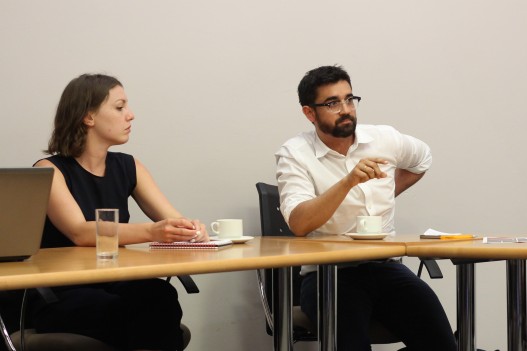
Who is responsible for poverty?
Audience commentary: This is a good conversation to have, but it is important to understand the context that transnational corporations operate in when they come to Africa, especially sub-Saharan Africa. Where does the responsibility lie with the notion of poverty as a human rights abuse? For example, if a mine is set up and people move into the area looking for employment when the project starts, are the living conditions of these people the responsibility of government or of the mining company? Would a Treaty addressing poverty deal with these issues?
Nyembe: There are “negative” obligations (for example, to respect) and “positive” obligations (for example, to fulfil). States hold both negative and positive obligations. Corporations more typically hold negative obligations. For example, they must not obstruct the realisation of a right or create a system of poverty. Ideally, however, they should also actively seek to realise certain rights by, for example, building houses and schools. If such contributions are seen as obligations, more positive effects could be felt in those areas.
What is the relevance of extra-territorial obligations?
Fine: Extra-territoriality cannot be ignored. The business community must acknowledge that international financial institutions and trade are run on the basis of extra-territorial law, much of which is useful to companies.
Suárez Franco: States alone sometimes are weak; states together can be stronger. If home and host states of a transnational corporation whose activities are resulting in human rights abuses cooperate to protect the human rights of affected communities and ensure remedies, the excuse of state weakness would not be valid anymore. We must connect African governments in order to strengthen the state and ensure implementation. Justiciability of extra-territorial obligations could support better results.
We need country ratification for the realisation of a Treaty. Even if NGOs support it, would it not jeopardise ratification to include economic social and cultural rights considerations?
Suárez Franco: The question of ratification will be difficult, but we must not allow it to stop the process entirely. Strong civil society pressure will be essential for realisation. In terms of form, it could take from the example of the Montreal Protocol and include follow-up mechanisms of revision, which advance the issues that cannot be agreed upon in the Treaty that is adopted during the first phase.
Fine: While the Treaty is a great campaigning idea, if the mechanism does arise, it will not be in the near future. A relatively small minority of states have expressed support for the idea in the Human Rights Council. Apparently the more in-depth the Treaty tries to go, the fewer countries that are likely to ratify it in the end. While this is not a reason not to go for it, it is a practical consideration to be grappled with.
Pitso Montwedi (DIRCO): People said the Tobacco Framework would never happen, yet it exists today.
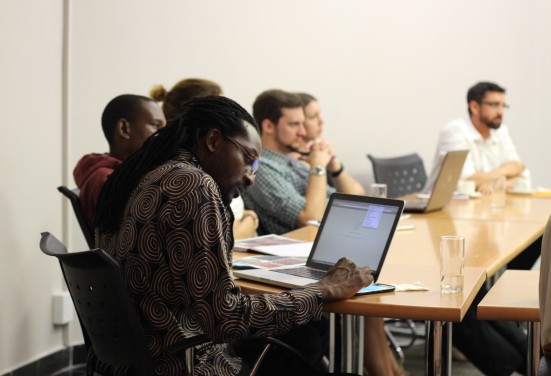
What can African civil society bring to the corporate accountability table?
Fine: Business must be persuaded that human rights due diligence and remedy is the right thing to do and in the best interests of shareholders. Civil society can play a role in persuading business of this. Business is vulnerable and sensitive to NGO work. Clever and effective work by NGOs can be influential.
Suárez Franco: While it is a difficult political battle, people will move due to suffering. Corporate abuse is touching the lives of all people around the world and awareness is increasing. States can be moved by civil society. Momentum in the UNGP NAPs process might even have picked up since the Treaty process began. Over 1000 organisations comprising the Treaty Alliance are pushing for the Treaty, at what is still the beginning of the process. Students and civil society organisations in Africa should get involved. Your knowledge will enable the development of a more interesting and representative instrument.
So… is a Treaty a good or bad idea?
Nyembe: Yes. CALS emphatically supports the Treaty in the context of the corporate-controlled and corporate-favoured system in which we operate.
Fine: We should continue if we think a Treaty would be more successful, but not be distracted from more immediate and practical work that can be done.
Suárez Franco: FIAN International and the Treaty Alliance do think a Treaty is an essential tool in the evolving character of international human rights law to ensure justice for all.
Conclusion
Africa has myriad stories to tell in the realm of corporate accountability. It is vitally important that these stories be shared on the international stage. African voices must be heard.
May the debate continue!
By: Anna Bulman
Disclaimer: The opinions expressed by the Realising Rights bloggers and those providing comments are theirs alone, and do not reflect the opinions of the Legal Resources Centre. The Legal Resources Centre is not responsible for the accuracy of any of the information supplied by the bloggers.
[i] Stories and opinions, where not those of the three panellists, have not necessarily been attributed to specific contributors at the debate. For a copy of the notes taken at the debate which provide this context, please contact the author Anna Bulman at anna@lrc.org.za.
[ii] Ecuador being the other. Human Rights Council resolution 26/9 (26th sess.), 26 June 2014.
The article is also available at:
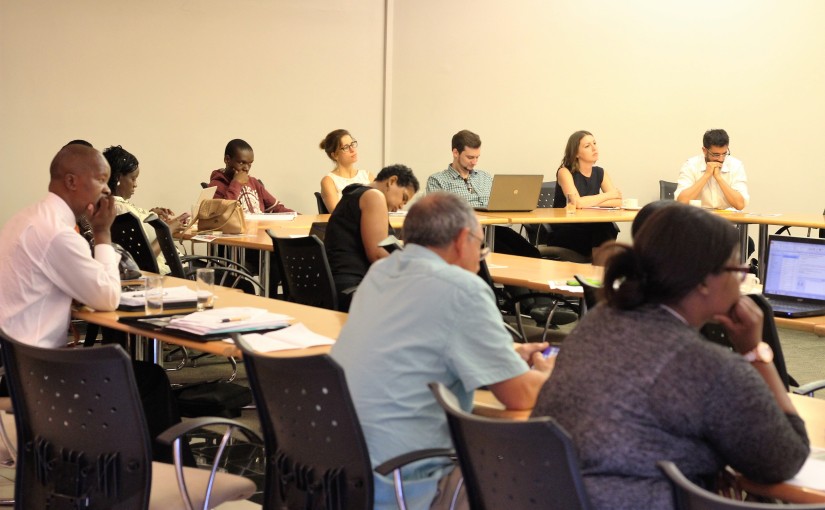
One thought on “South Africa Debates the Merits of the Proposed Treaty”